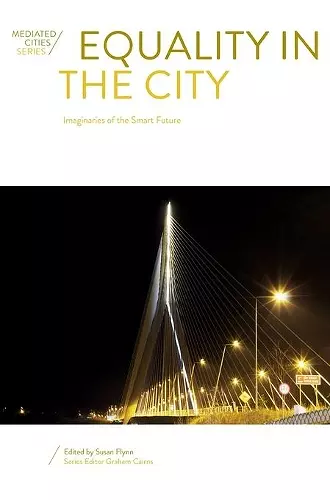Equality in the City
Imaginaries of the Smart Future
Graham Cairns editor Susan Flynn editor
Format:Hardback
Publisher:Intellect
Published:21st Jan '22
Should be back in stock very soon
This hardback is available in another edition too:
- Paperback£34.95(9781789387612)

This collection considers the city of the future and its relationship to its citizens. It responds to the foregrounding of digital technologies in the management of urban spaces, and addresses some of the ways in which technologies are changing the places in which we live and the way we live in them.
A broad range of interdisciplinary contributors reflect on the global agenda of smart cities, the ruptures in smart discourse and the spaces where we might envisage a more user-friendly and bottom-up version of the smart future. The authors adopt an equality studies lens to assess how we might conceive of a future smart city and what fissures need to be addressed to ensure the smart future is equitable. In the project of envisaging this, they consider various approaches and arguments for equality in the imagined future city, putting people at the forefront of our discussions, rather than technologies.
In the smart discourse, hard data, technological solutions, global and national policy and macro issues tend to dominate. Here, the authors include ethnographic evidence, rather than rely on the perspective of the smart technologies’ experts, so that the arena for meaningful social development of the smart future can develop.
The international contributors respond purposefully to the smart imperative, to the disruptive potential of smart technologies in our cities: issues of change, design, austerity, ownership, citizenship and equality. The collection examines the pull between equality and engagement in smart futures. To date, the topic of smart cities has been approached from the perspective of digital media, human geography and information communications technology. This collection, however, presents a different angle. It seeks to open new discussions about what a smart future could do to bridge divides, to look at governmentality in the context of (in)equality in the city. The collection is an approachable discussion of the issues that surround smart digital futures and the imagined digital cities of the future. It is aspirational in that it seeks to imagine a truly egalitarian city of the future and to ponder how that might come about.
Primary readership will be academics and students in social science, architecture, urban planning, government employees, and those working or studying in social justice and equality studies
'One of the strengths of this book is that its authors bridge familiar planning and broader urban studies theory with the contemporary challenges of new technology deployment. This bridging helps ground our engagement with the complexity of new technologies in our long-standing obligation to equitably evaluate how new changes in communities will affect all of our residents.
Planners reading this book will gain insight into how we might engage our residents in civic conversations about new technology adoption. [...] Individually and collectively, these chapters will help planners think more critically about the challenges and opportunities new technologies bring before we implement them. Equality in the City has many chapters that could be used in planning theory classes, allowing learners to see how the planning and urbanism theories that have long informed our practice also shed important light on new trends.'
-- Pamela Robinson, Journal of the American Planning AssociaISBN: 9781789384642
Dimensions: 244mm x 170mm x 17mm
Weight: 662g
286 pages